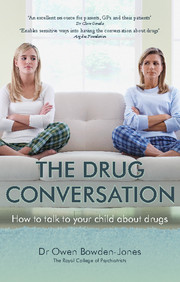Book contents
- Frontmatter
- Contents
- Acknowledgements
- Introduction
- 1 What are psychoactive drugs, who uses them and why?
- 2 Drug use and adolescence
- 3 Having the drug conversation with your child
- 4 Drugs and the brain
- 5 Types of drugs
- 6 Rise of the synthetics
- 7 Detecting drug use and what to do about it
- 8 Treatment and recovery
- 9 Final thoughts
- Appendix
- References
- Index
3 - Having the drug conversation with your child
Published online by Cambridge University Press: 01 January 2018
- Frontmatter
- Contents
- Acknowledgements
- Introduction
- 1 What are psychoactive drugs, who uses them and why?
- 2 Drug use and adolescence
- 3 Having the drug conversation with your child
- 4 Drugs and the brain
- 5 Types of drugs
- 6 Rise of the synthetics
- 7 Detecting drug use and what to do about it
- 8 Treatment and recovery
- 9 Final thoughts
- Appendix
- References
- Index
Summary
Good information is critical in decision-making. If you don't have the right information, how can you weigh up the risks and benefits of different choices? The challenge for parents is not just to provide the correct information, but to do so in a way that your child will pay attention to it.
For some parents, talking to their child about drugs is relatively easy, but for others it's awkward and embarrassing. It is a good idea to start talking to children about drugs before they come into contact with them or people who are using them. Having the right information early on will help them weigh up the risks and might stop them from even trying drugs. If they do choose to use drugs, good-quality information may help them reduce the risk.
Just as importantly, by talking with your child about drugs, you help them understand that this is a topic you know something about and you're happy to talk about, and that you might even be a source of good advice if problems arise.
Do I really need to talk to my child about drugs? Won't the school do it?
Many schools provide information to children about drugs, either from people within the school or by bringing in outside speakers. However, there are no specific requirements for UK schools to deliver a particular programme. Instead schools are given the flexibility to tailor their local personal, social, health and economic (PSHE) education programmes to reflect the needs of their students. Government guidance states that schools should ‘use their PSHE education programme to equip pupils with a sound understanding of risk and with the knowledge and skills necessary to make safe and informed decisions’ (Department for Education, 2013). Although the PSHE curriculum suggests covering the topic of drugs, schools do not have to. Drug education is a required part of the science curriculum, which begins in Year 6 (when students are 10 or 11 years of age).
Unfortunately, it is not clear which is the best way to teach children about drugs. Research suggests that teaching all children about drugs may not be the most effective approach (Faggiano et al, 2014).
- Type
- Chapter
- Information
- The Drug Conversation , pp. 30 - 47Publisher: Royal College of PsychiatristsPrint publication year: 2016



